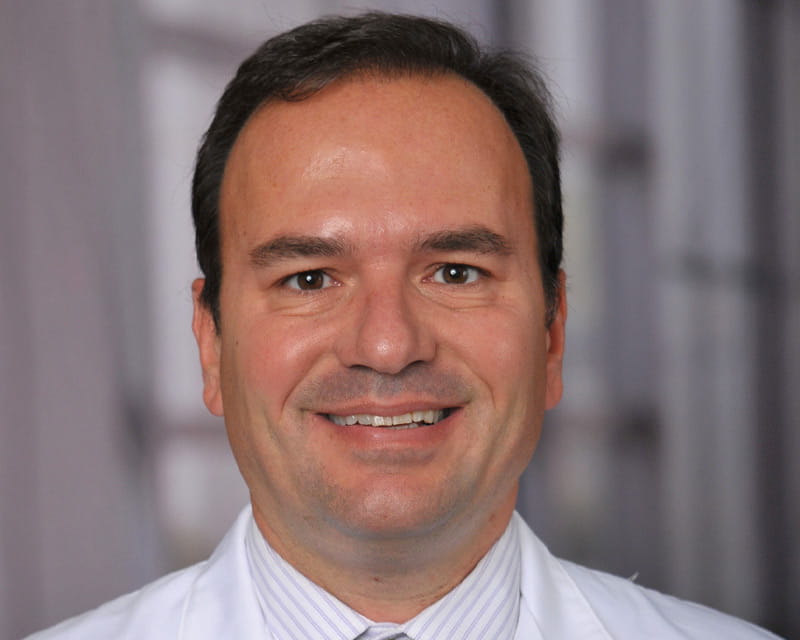
Comprehensive Esophageal Health Center opens with more convenient, streamlined care
 After a prolific, 13-year career at University of Pittsburgh Medical Center, gastroenterologist Georgios Papachristou, MD, PhD, has joined The Ohio State University Wexner Medical Center as the Dr. Samuel T. and Lois Felts Mercer Endowed Professor of Medicine and Pharmacology.
After a prolific, 13-year career at University of Pittsburgh Medical Center, gastroenterologist Georgios Papachristou, MD, PhD, has joined The Ohio State University Wexner Medical Center as the Dr. Samuel T. and Lois Felts Mercer Endowed Professor of Medicine and Pharmacology.
In his new roles as director of Advanced Endoscopy, medical director of Ambulatory Endoscopy and vice chair of Translational Research in the Department of Internal Medicine, Dr. Papachristou will expand Ohio State’s advanced endoscopy program and help build a multidisciplinary Liver and Pancreas Institute.
Having transitioned several grants to Ohio State, he’ll also continue to lead clinical and translational research initiatives — including novel studies that aim to improve outcomes for people with pancreatitis.
Not only does Dr. Papachristou, a professor at the College of Medicine, have extensive experience in endoscopic retrograde cholangiopancreatography (ERCP) and endoscopic ultrasound (EUS), he’s helping advance the emerging field of interventional EUS. These new procedures help physicians treat organs and lesions surrounding the gastrointestinal tract. They include:
“Even though some interventional EUS procedures are considered novel, they have already begun to augment or replace traditional procedures that are more invasive or less convenient to patients,” Dr. Papachristou says. “However, because these are technically challenging procedures, they are only performed by experienced therapeutic endoscopists who have access to state-of-the-art labs.”
Ohio State also offers advanced endoscopic procedures to treat bariatric surgery complications or implant new devices that promote weight loss. These include intragastric balloon placement and closure of fistulae.
When Dr. Papachristou joined Ohio State in August 2019, he brought three active grants related to pancreatitis prevention or treatment.
The first, "Stent vs. Indomethacin for Preventing Post-ERCP Pancreatitis," is a multicenter, randomized clinical trial funded by the National Institute of Diabetes and Digestive and Kidney Diseases. Researchers, who plan to enroll more than 2,000 participants, aim to compare the efficacy of two therapies to prevent post-ERCP pancreatitis: pancreatic stent placement combined with a nonsteroidal anti-inflammatory drug called indomethacin, or indomethacin alone.
“Pancreatitis is the most dreadful complication of ERCP, and until recently the only prevention strategy was prophylactic pancreatic stent placement,” says Dr. Papachristou. “Unfortunately, this intervention is also costly, time-consuming and comes with its own risks.”
The team is building off previous research that suggests rectal indomethacin not only reduces the risk of post-ERCP pancreatitis when combined with a pancreatic stent, it may be even more effective by itself — which could potentially eliminate the need for stent placement moving forward.
Ohio State is also the coordinating center for an industry-funded, multicenter observational study called "Post-acute Pancreatitis and Pancreatic Exocrine Insufficiency (PAPPEI)."
Researchers will perform three- and 12-month prospective assessments of exocrine pancreatic insufficiency (EPI), nutritional status and quality of life among patients who had an acute pancreatitis attack. Their goal is to help clarify the incidence, natural history and duration of EPI, as well as identify those patients who have a higher risk of developing EPI.
“Acute pancreatitis has traditionally been considered a self-limiting disease,” Dr. Papachristou explains. “We assume that once patients go home, they completely recover, but new evidence says this is not the case. We are trying, in a systematic way, to assess long-term complications as well as risk of pancreatitis recurrence, and aim to develop an extensive biorepository that can be used for future research.”
Dr. Papachristou, in collaboration with researchers from three other medical centers, has also received funding from the Department of Defense to investigate the link between alcohol use and pancreatitis. The team hopes to better understand how alcohol use triggers an acute pancreatitis attack, and whether accumulated alcohol consumption impacts recurrent pancreatitis.
“Our findings will help clinicians provide patient education and counseling,” Dr. Papachristou says. “They may also pave the way for novel treatments that help slow or prevent disease progression in acute pancreatitis.”